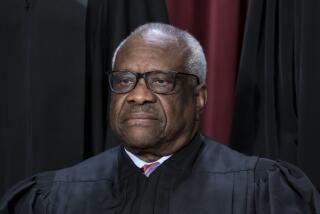Session Seen as Mixture of B Movie, Morality Play, Courtroom Drama : Media: Analysts find both parties to be persuasive, which tends to leave Thomas at a disadvantage. Sexually explicit nature of testimony called disturbing and incongruous.
- Share via
WASHINGTON — It reads a little like a B-movie handbill: sexually explicit language, adult situations, anger-filled, emotionally charged drama, a threatened resignation.
These elements, political analysts and media experts said, made the Senate Judiciary Committee hearing on Clarence Thomas Friday a most extraordinary and explosive confrontation.
They also turned the hearing into a mixture of morality play and courtroom strategy that perhaps few Americans may have wanted to hear and that some media consultants fear everyone will regret.
“It was like a cheap horror movie where the hero explodes the room with the villain inside of it, so the hero, his friends and the villain all are destroyed,” said Michael Sheehan, a consultant who advises Democrats on how to appear on television.
“But, here you get to pick who is your villain and who is your hero.”
From a strategic standpoint, analysts said Judge Clarence Thomas was probably persuasive and sympathetic in his morning appearance--even to viewers who might disagree with him ideologically. He denounced a process that forced him back to the committee room to answer degrading questions. As he denied the charges, he in effect challenged the Senate to vote him down. That, analysts said, effectively portrayed Thomas as a victim and turned the Judiciary panel’s process into the villain.
But Anita Faye Hill, the Oklahoma law professor accusing him of sexual harassment, was equally persuasive in her simple, slightly nervous, yet consistent and comprehensive explanation of her charges, analysts said.
And people from all sides--including Republicans advising the Thomas team--agreed that, if both Thomas and Hill seem credible, Thomas’ nomination is probably doomed--barring an unforeseen revelation.
“I find him very, very impressive and her totally credible,” said Douglas Bailey, a Republican media consultant who publishes the Political Hotline newsletter. “So, what do you do now? I just assume there are an awful lot of viewers and senators who will find it very hard to figure out what Hill has to gain in making the charges she is making if they are not true.”
One of the most disturbing but powerful aspects, those who study the media said, was the sexually explicit nature of the testimony. Those moments seemed incongruous in a hearing to discuss a Supreme Court nominee.
A sense of moving into uncharted territory was evident in the tension in the room. At one point, Sen. Orrin G. Hatch (R-Utah) even threatened to resign from the Judiciary Committee on the spot.
“There is a feeling that you have a vapor-filled room and someone is lighting a match,” Sheehan said. “It hasn’t ignited, but you can see the sparks.”
Most Americans probably found the televised hearing revolting, said Larry Sabato, a professor at the University of Virginia who has written extensively about media and politics. “This is the kind of thing that should be done in private.”
Any sense that this is unfortunate will be reinforced by the the consistent drumbeat in the press that the Senate failed to deal with these allegations properly, said Shanto Iyengar, a UCLA professor who has worked extensively in the area of how TV news influences American opinion.
The context in which this has been presented is: “Here we have a group of upper-middle-class older white men, spoon-fed this information (by their staff), and they could not understand (the sexual harassment charges) and they passed it off as unimportant.”
Although this negative context can fade very quickly, Iyengar said, it is reinforced by news of congressional bounced checks and fixing tickets.
Therefore, for many Americans, the Senate and politics in general may be the losers. But this larger impression is separate from the specific drama.
Here, the shocking language and content of the hearing may tend to strengthen Hill’s allegations in the public’s mind.
“People tend to be moved by extreme situations (in the news) . . . and, by the standards of what people get normally from television, this was clearly at the fringe,” Iyengar said. “This will make what Hill is saying seem very significant.”
Analysts had praise for Thomas also.
“I thought Thomas was very powerful,” said David Gergen, a former Ronald Reagan Administration communications director. “He took on the committee frontally, and that is often effective.”
It worked well, for instance, for Oliver L. North in the Iran-Contra hearings.
Implicit in Thomas’ approach, Gergen said, was a threat that, “if the committee members try to humiliate him, he is going to walk away from the process. That puts the onus on them, not Hill, for driving him out.”
That advantage, analysts said, was probably increased immediately after Thomas’ opening statement, when Hatch charged that the way the committee chairman, Sen. Joseph R. Biden Jr. (D-Del.), planned to conduct the hearing was unfair to Thomas. Hatch threatened to resign from the committee unless things were changed.
Hatch’s threat not only reinforced Thomas’ argument but also resulted in a change in schedule, whereby Hill had to testify immediately.
“While it may have been an accident,” said Democratic consultant Sheehan, “it is similar to basic debate ploy, in which you plan a 90-second response and give a two-second answer in hope of catching your opponent off guard.”
Most thought all of this was effectively countered. “One could not have found a more likable and sympathetic witness than Anita Hill,” Robinson said.
Joshua Meyorwitz, a professor of communication at the University of New Hampshire, said the remarkable aspect of the hearings is the extent to which they further the effect of television to create politics based on “intimacy.”
More to Read
Get the L.A. Times Politics newsletter
Deeply reported insights into legislation, politics and policy from Sacramento, Washington and beyond. In your inbox twice per week.
You may occasionally receive promotional content from the Los Angeles Times.






